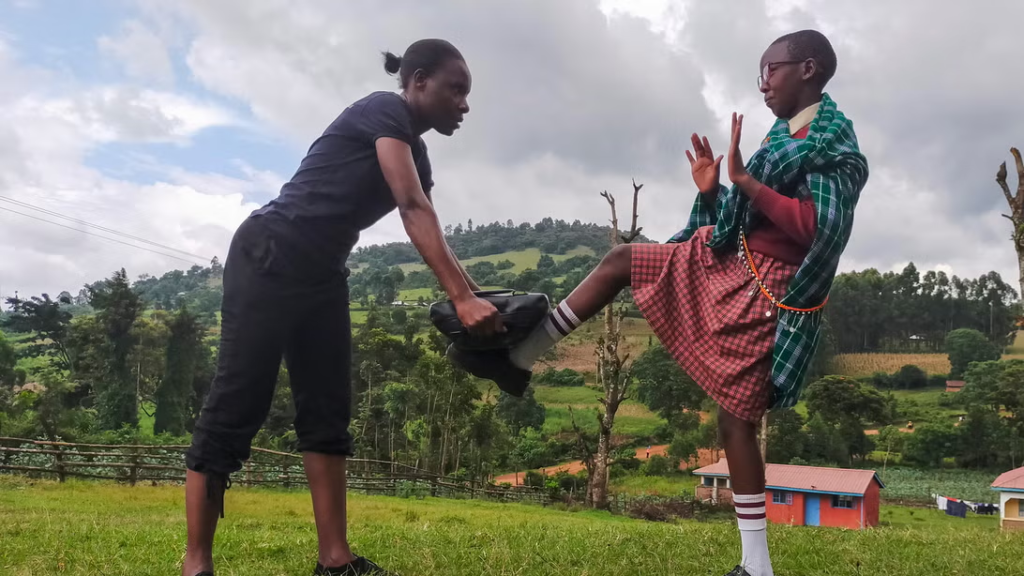
“I am worth defending!” chant a group of girls as they take up defensive stances, preparing to practice combat techniques. These girls aren’t part of a martial arts club; they are Maasai girls living at a boarding school in Transmara, western Kenya. The school also serves as a rescue center for girls who have escaped early marriage and female genital mutilation (FGM).
“We learn how to protect ourselves, how to protect our bodies,” says Grace Musheni, 14, who has been studying and living at the Enkakenya Centre for Excellence since 2023.
The center, established in 2009 by Kakenya Ntaiya, a Maasai woman who herself underwent genital mutilation, provides a safe refuge for girls at risk of early marriage. It also offers a free high school education, encouraging parents to let their daughters stay in school rather than undergo the ritual, still common among Maasai girls aged 8 to 17.
Once a girl is circumcised, she is seen as an adult and is often married off, ending her childhood and education. “Most child marriages are caused by poverty in families,” explains Musheni. “Because of this poverty, a parent might marry off their daughter to an older man in exchange for payment.”
While Ntaiya couldn’t escape FGM herself, she convinced her father to allow her to continue her education, and today she holds a Ph.D. in education from the University of Pittsburgh, along with multiple awards for her work. “I am a beneficiary of proper education and really wanted to show my community how important it is to empower women and girls,” she says.
Despite Kenyan laws prohibiting both FGM and marriage before age 18, these practices persist, especially in rural areas with lower education levels. According to the 2022 Kenya Demographic and Health Survey, 56.3% of women with no education have undergone FGM, compared to only 5.9% of women who completed secondary school or higher.
Education appears to have a significant impact on reducing gender-based violence. The survey found that 34% of Kenyan women without education have been victims of physical violence, a number that drops to 23% among educated women. However, this remains alarmingly high. To address this, the Enkakenya Centre collaborates with the organization I’m Worth Defending to teach self-defense skills to the girls.
The goal isn’t just to prepare the girls to physically defend themselves, although they could, but to help them develop assertiveness in all aspects of their lives. “We teach them basic principles of assertiveness and boundary-setting, including both verbal and physical techniques,” explains Amelia Awuor from I’m Worth Defending. “These skills help instill the confidence to speak up against violations or defend themselves from threats.”
For 14-year-old Rahab Lepishoi, the training empowered her to speak out. During a visit to her older sister, she learned that girls in her village were about to undergo FGM, including an old childhood friend. “I told her about the dangers of FGM and encouraged her to come with me to avoid it,” Lepishoi says.
Following in the footsteps of her educators, who travel to remote communities in Transmara every year to raise awareness about FGM, early marriage, and the importance of education, Lepishoi now applies the skills of assertiveness and confidence she’s learned. “When I visit places, I educate my friends so that when they meet with a boy, they can confidently say what they mean,” she says.
The self-defense classes also help protect the girls from sexual abuse, which can lead to forced marriages. “When a girl reports abuse, it’s common for the parents to force her to marry the man who abused her,” Musheni explains.
Fifteen-year-old Purity Risanoi, who has been at the school for five years, faces cultural pressures from her community. “My family is still very traditional,” she says. “When a girl grows up, she is expected to get married, and she cannot choose who she marries.”
Her solution? Keep studying. Risanoi hopes to one day become a lawyer.
Meanwhile, Musheni dreams of becoming a software engineer. She wants to return to her community and use technology to uplift others. “Girls can achieve great things,” she says. “I want to inspire others to chase their dreams.”
The Associated Press receives financial support for global health and development coverage in Africa from the Gates Foundation. The AP is solely responsible for all content. For more information, visit AP.org.